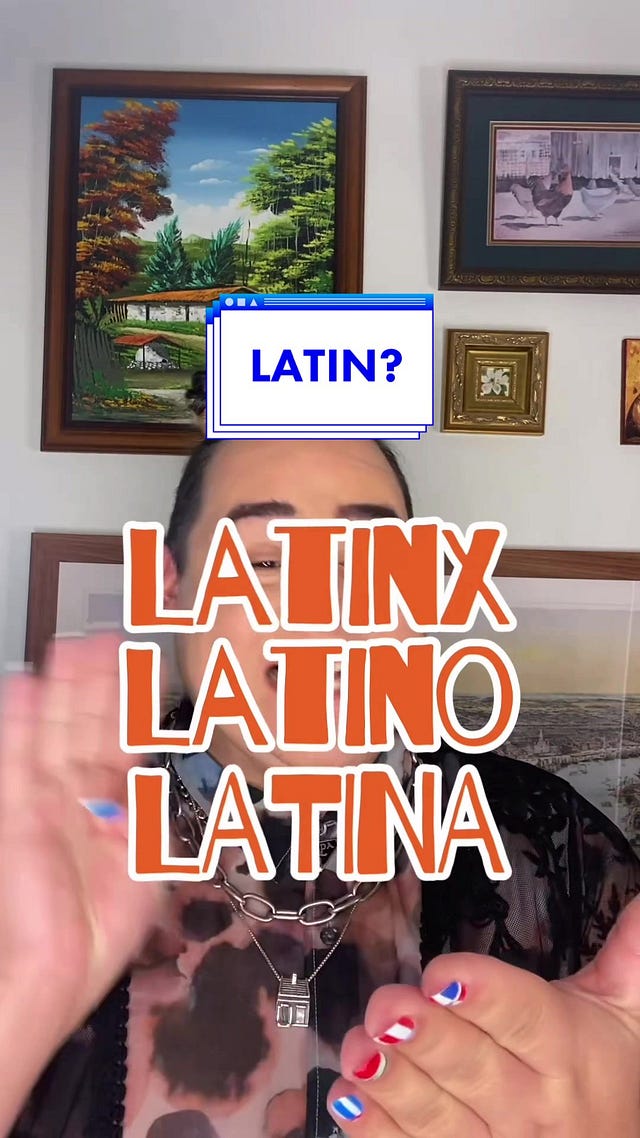Call a brown person “Latinx” (pronounced lah-teen-ex) and you’re liable to get one of two reactions:
Nothing, and the conversation continues
A wtf look
Some people really hate that word. I’m not a huge fan. But why does it exist and why do so many people have strong opinions about it?
What Makes Us Brown
In researching last week’s post about the origin of Hispanic Heritage Month, this tidbit on the name from the linked NPR article stood out:
[Sociologist at the University of California, Berkeley Cristina] Mora recalls several of the options being floated at the time included "Brown," "Latin American," "Latino" and Hispanic.
And we all know which one won.
Personally, I like the term “brown.” There’s a certain “fuck the establishment” attitude that comes with identifying with the color of dirt, of being dirty, a dirty word.
But also of coming from the earth, of giving life.
And I like that it also encompasses just about any “foreign” looking person, whether they be of Hispanic descent or not.
I have nephews with Turkish and Indian blood, from their mom’s side. They look Middle Eastern, as does their father, who is neither. Like me, he is both Mexican on our mother’s side and Puerto Rican on our father’s. But we all have that “foreign” blood in us, forging our Otherness.
If you didn’t know their (or maybe even my) ethnic background, you’d likely have a tough time pinpointing it. “Brown” includes all of it.
And this is what most discussions about what to call ourselves miss. While 47% of Hispanics (those descending from a Spanish-speaking country) identify with their home country, for even some of us first-gens, there is no ONE nationality to latch onto.
The nephews, being second-generation, have 4 of those to contend with.
So, we’re brown.
But I’ll also include myself in the terms Hispanic, Latina, and my favorite: Latine.
Latine vs Latinx
The AI that creates the transcript for La Vida Más Chévere gets this wrong every single time but the intro to my show is:
Buen día mi gente, and welcome to La Vida Más Chévere, the place where Spanglish-speaking, childfree Latinas y Latines are learning to dismantle the toxic cultural bullshit we all grew up with.
If I didn’t correct that, the transcript would say Latinas & Latinas. (If I ever miss that, please let me know!)
But why do I use Latine over Latinx? For one, it’s how the word feels in my mouth. Latine is pronounced lah-teen-eh. It sounds beautiful. Elegant even.
And it’s easy to say in both colonizers languages, English and Spanish.
To my ears, Latinx sounds harsh, it clashes, it hurts.
And it’s meant to.
The origin of the term is murky but it was originally used to X or cross out the O or the A in Latino/Latina because Spanish is a gendered language. The credit is given to queer1 people for creating it:
“White people did not make up Latinx,” he [Mexican American linguist David Bowles] says. “It was queer Latinx people... They are the ones who used the word. Our little subgroup of the community created that. It was created by English-speaking U.S. Latinx people for use in English conversation.”
It’s a heavy and necessary tool in the unending fight for inclusion.
I’ve also heard and seen the use of the at symbol (@) to incorporate both: Latin@. And while that works when written down, how do you pronounce that in spoken language?
Latin-at? Latin-at-oh? Quién sabe.
There’s a lot written about this, every year. A selection of my favorite reads:
What's in a Name? Hispanic, Latino, and More Explained by childfree Latina Lucy Flores gives an explanation of all the different monikers that might apply
Who Gives a Shit if the Majority of Hispanics Don’t Know or Use Latinx by writer and social critic César Vargas is a scathing rebuke on why the argument is a waste of time and a diversion from what actually matters
And this great video by Andrés Acosta, a non-binary Latine creator, entertainer, and educator:
Which Term to Use?
Language is constantly evolving and we’re in the middle of another linguistic shift in this country. Latinx seems to be winning, but as a global community, it’s not accepted by all. Some aren’t willing to let go of the gendered binary system.
They, like the dinosaurs before them, will also die out.
My vote is for Latine, obviously. And I will continue to use and normalize it here and on the podcast. Because, maybe, some of the the toxic cultural bullshit we all grew up with also includes the language we’re so used to.
The bottom line is to call people what they want to be called, and recognize that it won’t be the same for everyone.
If you see a person give you that wtf look from the example up top, stop and ask “do you prefer a different word?”
And then continue the conversation.
Like this post? Share with a friend! Get on the leaderboard!
Support this publication by:
“Queer” is another term with its own storied heritage
PS: if you’ve gotten this far, today is also Talk Like a Pirate Day, so have a good one!






